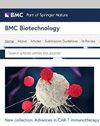Transcriptomic and targeted metabolomic analyses provide insights into the flavonoids biosynthesis in the flowers of Lonicera macranthoides
IF 3.5
3区 生物学
Q2 BIOTECHNOLOGY & APPLIED MICROBIOLOGY
引用次数: 0
Abstract
Flavonoids are one of the bioactive ingredients of Lonicera macranthoides (L. macranthoides), however, their biosynthesis in the flower is still unclear. In this study, combined transcriptomic and targeted metabolomic analyses were performed to clarify the flavonoids biosynthesis during flowering of L. macranthoides. In the three sample groups, GB_vs_WB, GB_vs_WF and GB_vs_GF, there were 25, 22 and 18 differentially expressed genes (DEGs) in flavonoids biosynthetic pathway respectively. A total of 339 flavonoids were detected and quantified at four developmental stages of flower in L. macranthoides. In the three sample groups, 113, 155 and 163 differentially accumulated flavonoids (DAFs) were detected respectively. Among the DAFs, most apigenin derivatives in flavones and most kaempferol derivatives in flavonols were up-regulated. Correlation analysis between DEGs and DAFs showed that the down-regulated expressions of the CHS, DFR, C4H, F3’H, CCoAOMT_32 and the up-regulated expressions of the two HCTs resulted in down-regulated levels of dihydroquercetin, epigallocatechin and up-regulated level of kaempferol-3-O-(6’’-O-acetyl)-glucoside, cosmosiin and apigenin-4’-O-glucoside. The down-regulated expressions of F3H and FLS decreased the contents of 7 metabolites, including naringenin chalcone, proanthocyanidin B2, B3, B4, C1, limocitrin-3,7-di-O-glucoside and limocitrin-3-O-sophoroside. The findings are helpful for genetic improvement of varieties in L.macranthoides.转录组和靶向代谢组分析有助于深入了解忍冬花中黄酮类化合物的生物合成过程
黄酮类化合物是大花忍冬(Lonicera macranthoides)的生物活性成分之一,但其在花中的生物合成仍不清楚。本研究结合转录组学和靶向代谢组学分析,以阐明大花忍冬开花期间黄酮类化合物的生物合成。在GB_vs_WB、GB_vs_WF和GB_vs_GF三个样本组中,类黄酮生物合成途径中的差异表达基因(DEGs)分别为25、22和18个。在大花杓兰花的四个发育阶段,共检测和定量了 339 种黄酮类化合物。在三个样本组中,分别检测到了 113、155 和 163 种差异积累类黄酮(DAFs)。在这些DAFs中,黄酮类化合物中的芹菜素衍生物和黄酮醇类化合物中的山奈酚衍生物大部分都被上调。DEGs 与 DAFs 之间的相关性分析表明,CHS、DFR、C4H、F3'H、CCoAOMT_32 的表达下调和两个 HCTs 的表达上调导致二氢槲皮素、表儿茶素的水平下调,而山奈酚-3-O-(6''-O-乙酰基)-葡萄糖苷、波斯菊素和芹菜素-4'-O-葡萄糖苷的水平上调。F3H和FLS表达下调会降低柚皮苷查尔酮、原花青素B2、B3、B4、C1、柠檬苦素-3,7-二-O-葡萄糖苷和柠檬苦素-3-O-槐糖苷等7种代谢物的含量。这些研究结果有助于改良大叶女贞的品种。
本文章由计算机程序翻译,如有差异,请以英文原文为准。
求助全文
约1分钟内获得全文
求助全文
来源期刊

BMC Biotechnology
工程技术-生物工程与应用微生物
CiteScore
6.60
自引率
0.00%
发文量
34
审稿时长
2 months
期刊介绍:
BMC Biotechnology is an open access, peer-reviewed journal that considers articles on the manipulation of biological macromolecules or organisms for use in experimental procedures, cellular and tissue engineering or in the pharmaceutical, agricultural biotechnology and allied industries.
 求助内容:
求助内容: 应助结果提醒方式:
应助结果提醒方式:


